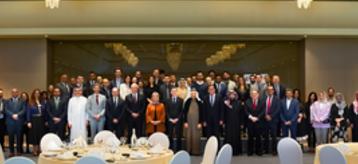Sustainable mobility can unlock $400bn in GCC: report
Governments in the Gulf Cooperation Council (GCC) could unlock $400 billion of socio-economic value through the adoption and deployment of sustainable mobility strategies and technologies, according to a new report from Strategy& Middle East, part of the PwC network, entitled Sustainable Mobility: Inverting the Transport Pyramid.
GCC countries have ambitious goals to reduce greenhouse-gas emissions and achieve sustainable development. To achieve these goals, governments must incentivize environment-friendly and energy-efficient modes of transportation such as electric- and hybrid-powered vehicles, vehicle sharing, and micromobility such as scooters and bicycles.
“Privately owned vehicles remain the most popular mode of transportation. CO2 emissions and congestion have cost ramifications and hinder our region from achieving sustainability goals,” said Mark Haddad, principal with Strategy& Middle East. “To reverse this trend, several cities are building new and modernizing existing public transport systems including metro, tram, and bus networks. Some also have ambitious goals to adopt smart mobility technologies within the next decade,” he added.
In recent years, there has been a significant investment in bus and metro projects in larger GCC cities. Electric bus trials were introduced in Abu Dhabi and Sharjah in 2019. The Doha metro, which covers 76 kilometers over three lines, has been fully functional for over a year. Recently, the Dubai Metro, the region’s first metro system, opened the first line of its planned expansion for the delayed Expo 2020. The Riyadh metro is also set to open its first lines by the end of 2021. Other vast infrastructure projects are in various stages of implementation and should begin operating within the coming decade.
To unlock the full value of sustainable mobility, they need to adopt a five-pillar framework to modernize the transportation sector sustainably.
“We believe this framework could unlock about US$400B in economic value over the next 20 years,” said Dr. Shihab Elborai, partner with Strategy& Middle East. “It will enable a self-sustaining, intelligent, and carbon neutral movement of people and goods.”
The five pillars for unlocking value
First, a multi-modal, integrated, and robust public transport system is central to sustainable mobility systems. Governments should continue to invest in these systems and aim to shift to a fully electric fleet.
Second is electrification. Governments should enable and encourage EV adoption for privately owned cars and create a network of charging stations in parking lots in high-traffic areas. In 2020, 3.2 million EVs were sold worldwide, up 43 percent over 2019, during a pandemic and an economic slowdown.
Next, cities can encourage shared mobility solutions to increase riders per vehicle, improve asset utilization, and move commuters more efficiently.
Another key pillar is ‘Soft modes of transport’ - micromobility solutions can increase the options for urban residents and increase usage of public transport by addressing first-mile and last-mile connection challenges.
Finally, ‘future communities’ - with sustainable urban designs¬ that make vital goods and services available within walking distance from residential areas. Roshn and the Line at NEOM in Saudi Arabia are key examples.
To support these five pillars, governments should invest in four critical foundational aspects. Infrastructure is one – and can include repurposing existing roads to make them more pedestrian-friendly and building charging stations for EVs. Another is technology, to aggregate data from various mobility modes; and generate insights into traffic patterns, consumer trends, and emissions performance. Government policies can also incentivize green and sustainable mobility options. Funding also matters. Cost-sharing initiatives between public and private entities can fund the transportation network of the future.
“GCC countries have taken important steps to build sustainability into their national development plans,” said Gustave Cordahi, manager with Strategy& Middle East. “They must now apply this approach to the mobility sector. By “inverting the transport pyramid,” governments can improve their sustainability performance, making GCC cities safer, healthier, and more economically relevant for today’s residents and future generations,” he concluded.—TradeArabia News Service
Source: http://www.tradearabia.com/news/IND_382985.html


